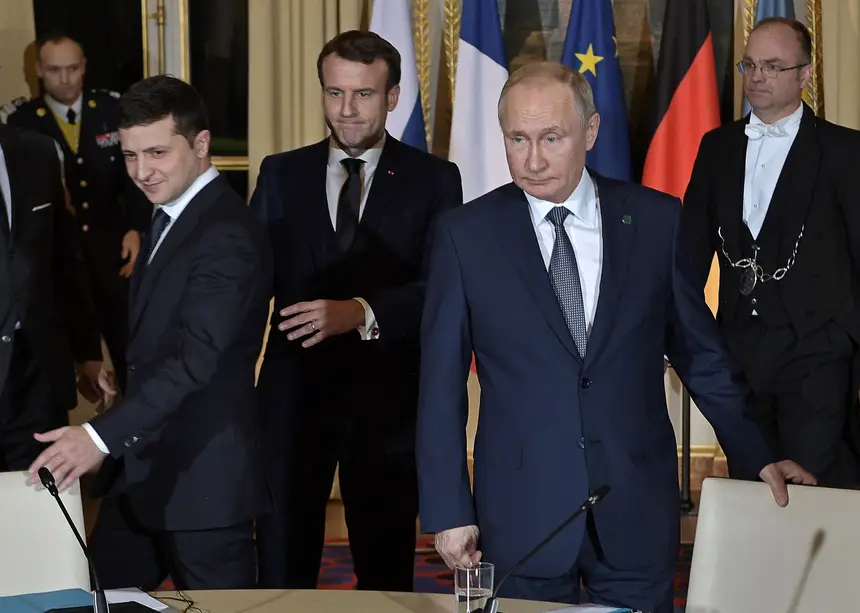John Laughland, who has a
doctorate in philosophy from the University of Oxford and who has taught at
universities in Paris and Rome, is a historian and specialist in international
affairs.
10 Dec, 2019 12:37 /
Updated 2 hours ago

© AFP
/ Alexey NIKOLSKY / SPUTNIK
The Paris talks on Ukraine
have enabled Putin and Zelensky to meet for the first time. But they have
agreed only to kick the can down the road, to agree to disagree, while seeking
progress on issues other than the war in Donbass.
It would be difficult to exaggerate
the weakness of Ukrainian President Volodymyr Zelensky’s position. He is a
political novice facing perhaps the most experienced and formidable statesman
in the world. Although an intelligent man, the former TV comedian says he likes to do things quickly.
Russian President Vladimir
Putin, by contrast, is known for his extreme attention to detail and for his
propensity to play a very long game.
Putin is not in a rush.
Zelensky is, because time is not on Ukraine’s side. The country has avoided
default by a whisker only by negotiating a new IMF loan to pay off the old one taken out five years ago
and due for repayment this year.
The gas pipeline Nord Stream
2 is about to be completed, partly sidelining Ukraine as a transit country for
European gas, thereby reducing both its political clout in Europe and,
crucially, its revenue from transit fees. Zelensnky needs a new agreement with
Gazprom by the end of this year, i.e. in the next three weeks. It is not yet in the bag.
The worst development for
Ukraine, however, is in the US. Trump’s enemies, who are seeking to impeach him
over Ukraine, are above all horrified at what they thought was Trump’s desire
to stop arming the country.
When the director of
European affairs at the US National Security Council, the Ukraine-born Col.
Alexander Vindman, gave evidence to the House Intelligence Committee on
November 19, he said that he was “shocked” when he heard the
phone call between presidents Trump and Zelensky. But what shocked him was not
the alleged quid-pro-quo Trump was asking for, dirt on Biden in return for aid,
but instead his understanding that US policy on Ukraine was being
abandoned.
Other Trump enemies have
also made it clear that the specific reasons why they want to impeach Trump are
but a cover for their main obsession, which is that the US should maintain its
strong support for Ukraine and that there be no rapprochement with Russia and
no revision of the Russiagate narrative. This was, for instance, clear in Fiona
Hill’s testimony.
What this means for Zelensky
is that Ukraine has become a political football in Washington. It is at the
heart of the impeachment hearings. Whatever the outcome of that process, being
pro-Ukraine will henceforth mean being anti-Trump and vice-versa.
After more than two years of
anti-Russia hysteria by the Democrats, scepticism about Ukraine will inevitably
rise among Republicans. Support for Ukraine will no longer be bi-partisan. And
since there is every likelihood Trump will survive impeachment and be
re-elected, Kiev only has two more years left. If he wins a second term, Trump
will be able to do whatever he likes, unimpeded by the machinations of “the
deep state” praised for its opposition to Trump by the New York Times.
All this explains why
Zelensky got so little out of the Paris talks. He was not able to discuss Crimea, whose incorporation into Russia has therefore
effectively been accepted by the EU. He has accepted the Steinmeier
formula which
Ukrainian nationalists hate because it forces Ukraine to grant decentralized
federal status to Donetsk and Lugansk. And he has seen the Minsk agreements of
2014 and 2015 confirmed and used as a basis for continuing discussions.
Although the Minsk agreements were long ago incorporated into a UN Security
Council Resolution, and are therefore very difficult to ignore,
nationalists in Ukraine regard them as an agreement extorted from Ukraine under
Russian military pressure.
On paper, therefore,
Zelensky has not done well. However, if prisoner exchanges continue, following
the initial one in September; if there genuinely is a ceasefire by the end of the year; and if Ukraine manages
to renegotiate anything more than a one-year deal on gas transit with Russia,
then Zelensky will be seen as having brought home tangible benefits. The
concrete results are probably just as politically valuable to him as any
hypothetical (but in reality improbable) comprehensive peace agreement.
Paradoxically, Zelensky has
one strong point. Putin likes him and wants him to succeed. Moscow knows that
Ukraine is bitterly divided between pro and anti-Russian factions and that they
take power one after the other. The Orange Revolution in 2004 lasted only 3
years before Viktor Yanukovich won parliamentary elections and became prime
minister and then president. The Maidan revolution has lasted 5 years but with
the same result; the aggressively anti-Russian party is out of power.
Given that France wants to put the Ukraine issue to bed in order to work
with Russia on a host of other issues, that Angela Merkel is determined to see the construction of North Stream 2
through to a successful conclusion, and that Trump may well get a second
term, Ukraine is looking politically fragile on the international stage, if not
yet isolated. If the Paris talks have told us one thing, it is that Zelensky’s
best friend, right now, is Putin. Such are the ironies of international
politics.
No comments:
Post a Comment
Note: Only a member of this blog may post a comment.